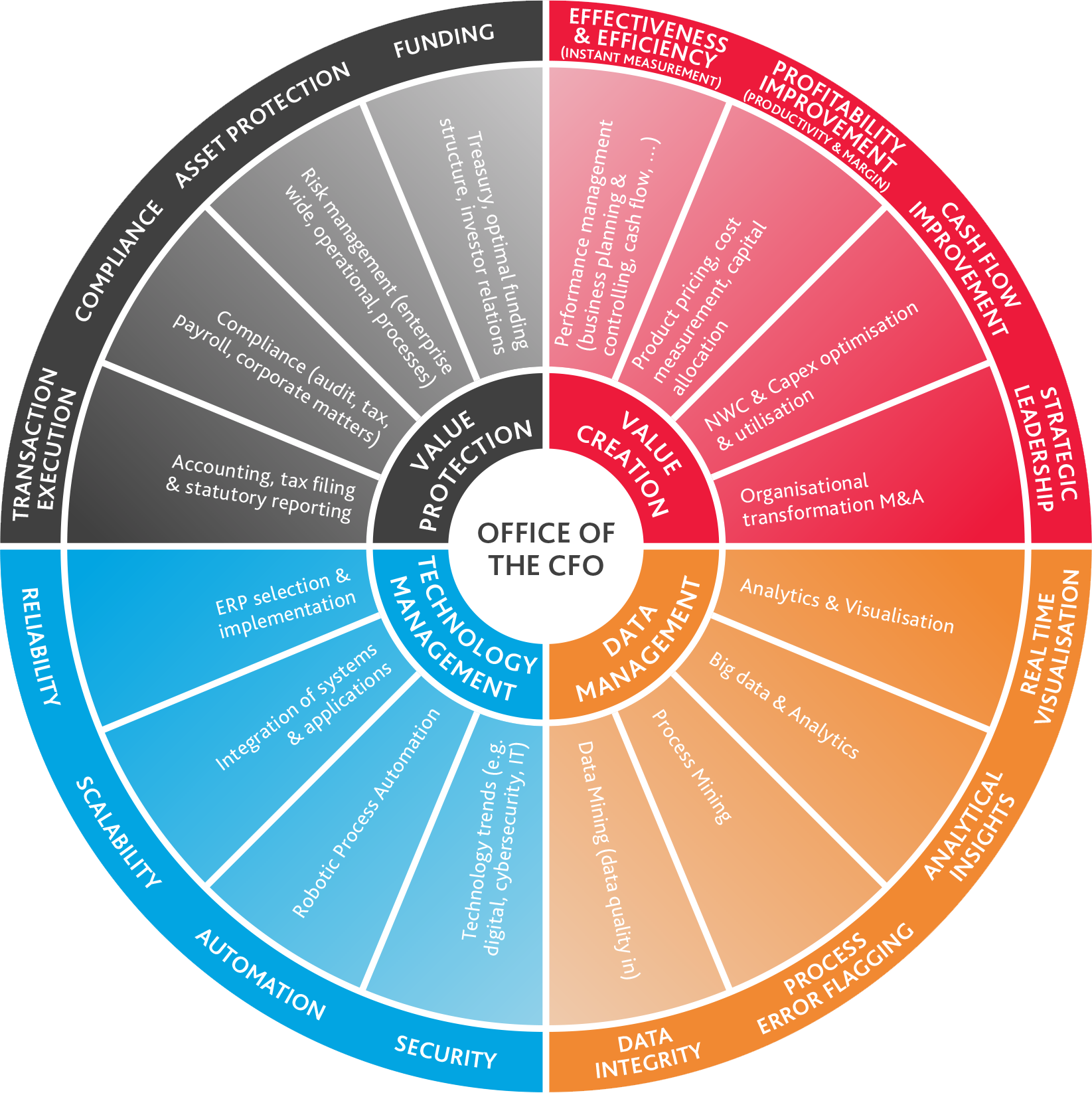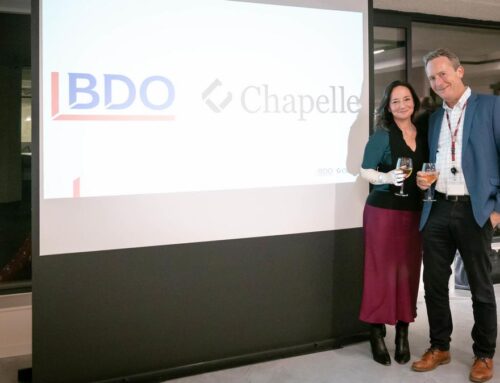BDO launches the ‘Office of the CFO’
Is your finance department ‘fit for the purpose’ and ‘fit for the future’?
The coronavirus crisis is exerting great pressure on CFOs and, at the same time, it’s exposing a number of bottlenecks. For example, the question arises whether your finance department has enough leeway and the right resources to meet current and future expectations. What is the degree of performance (including digital), relevance and accuracy of the available data, analyses and reports? BDO has gathered together all the challenges that CFOs face and created an ‘Office of the CFO’ concept – a 360° policy for today and tomorrow.
Author: David Delcourt, Advisor BDO Financial Advisory

Picture: Alexander Veithen, Partner BDO Financial Advisory
All CFOs ask themselves whether their finance department is performing as well as it should and whether it will be able to handle future challenges. As a result of COVID-19, such questions are more urgent than ever. It is the CFO’s task to keep a vigilant eye on the impact on profits, required working capital and liquid assets resulting from this rapid and unexpected change to the company’s production process or range of services.
“The hypotheses kept changing, and fluctuating spreadsheet scenarios led to sleepless nights for many financial directors and controllers,” says Alexander Veithen, Head of Financial Advisory at BDO, speaking from experience. “At many companies, the CFO discovered that the available tools were often inadequate; either too slow, reliant on too many different sources of information and inconsistent data, or lacking in processing power. All while that CFO also highly needed a new perspective on the figures within an entirely new context.”
In short, now is the time to abandon old certainties and switch over to integrated, advanced data and financial management. Management that meets the latest digital expectations, while also minimising workloads and required resources. After all, the CFO of tomorrow is sure to be a ‘digital CFO’.
Finance is not a cost centre
Many family businesses, as well as larger groups, still see the finance department as a cost centre, with duties limited to reporting on financial statements and budgets. Thus, this function must be satisfied with only basic tools and meagre resources. Alexander Veithen says: “To be honest, this will not change overnight. CEOs have a clear preference for investments with commercial and operational elements; that’s not going to change just like that.”
However, it is up to the CFO to prove that limited investments will enable him or her to gain efficiency and free up time for data analyses that can lead to relevant recommendations, improving profitability and generating future cash flows. Creating value (or additional value) for the company, in other words. “Moreover, under pressure from the speed of change, the finance department must become even more efficient and reliable. This can be achieved through a flexible, integrated approach to data, with up-to-date processes. Only then can a finance department consider itself ‘fit for the purpose’ and ‘fit for the future’.” To determine whether you can achieve these objectives with existing resources and strategies, BDO has developed the ‘Office of the CFO’.

360° performance scan for the CFO
In essence, the CFO’s core task is to create and increase value (see also the article ‘The future of the CFO starts today’). However, this cannot be done without relevant and accurate data input and the right technology to work with that data proactively and with as little effort as possible. Once the value creation is reflected in the numbers, it’s time to sustain and safeguard the value increase. The right combination of ins and outs ensures a CFO Office that is both ‘fit for the purpose’ and ‘fit for the future’.
De CFO van morgen is immers zonder twijfel een ‘digitale CFO'.
Technology management: efficient and reliable
Many companies do not have integrated ERP software to manage all of the processes within the company. Management systems must therefore be made to interact (via interfaces) and system data must be extracted to a database (the ‘cube’). Thanks to this solution, certain tasks can be carried out afterwards, such as analyses combining both financial and operational data. There is no longer need to decide what data to collect, how to collect and store them, or how to use them and for what purposes. After all, such decisions can quickly result in software overloads (permanent storage, storage of all historical or aggregate data, data processing speed, etc.).
Walter Vanherle, Partner BDO Digital, says: “Working with functionally complementary management systems is increasingly accessible thanks to paid applications (EMAsphere, BrightAnalytics, Bijster, etc.) that are compatible with your accounting system and can incorporate operational data. Alternatively, tools such as Power Query, Power Pivot and Power BI are even integrated into Excel free of charge, but these do require a certain level of know-how.”
Furthermore, RPA (Robotic Process Automation) can be used to easily automate certain time-consuming, manual processes such as the creation and repeated pasting and editing of data for financial or operational processes. This leads to higher efficiency and significantly reduces the risk of errors. Walter Vanherle: “And don’t forget ‘hands-free accounting’; automatic booking of bank transactions and outgoing invoices. But have you considered booking incoming invoices automatically as well, simply by scanning them (also with an approval function)?”
Finally, if it becomes apparent that management systems and processes such as Procure-to-Pay or Order-to-Cash are not sufficiently integrated, which requires manual processes and longer data processing and execution times, “then it is time to reconsider the ERP and perhaps opt for an integrated ERP solution such as NetSuite.”
Data management: high-quality data from input onwards
Even the best software and ERPs cannot guarantee efficient management. Everything depends on the quality of the input data and how easy they are to collect. This is done using so-called process mining. “This is often a very onerous task in production and sales environments,” says Walter Vanherle. “After all, to calculate the cost per unit, you must collect consumption data (machine time, hours of labour, raw materials, waste, etc.) and the respective costs in each production phase. Not only to calculate the cost price, but also a possible decrease of the cost price when you change a parameter in the production process. The right granularity and the quality of the input data are therefore extremely important.”
Once input quality is assured, the objective is two-fold:
Such predictive analyses are almost impossible without automated, optimised data collection.
“RPA leads to higher efficiency and significantly reduces the risk of errors.”
Value creation: measuring performance
A modern CFO’s role is no longer limited to numbers and fact-finding. On the contrary, the CFO contributes to value creation at a strategic level (to learn how BDO assures companies of sustainable value growth, be sure to also read the article ‘How to enhance your company’s value?’). Alexander Veithen says: “Targeted cost control and efficient product pricing can lead to improved profitability and cash flow. As a sparring partner to the production manager, why wouldn’t a CFO even develop a detailed calculation model for cost manufacturing? A model that incorporates parameters and data, making it possible to simulate changes in the production process. In short, value creation is the result of extensive cost/manufacturing controlling and commercial finance controlling and dovetails with the integrated management of required working capital, investment analysis and control of financial debt.”
Value protection: adequate internal auditing
Ensuring an adequate internal auditing procedure is one of the CFO’s basic duties. We will not go into more detail in this article. However, be aware that here, too, efficiency depends on an essential combination of data, process mining, process automation, cybersecurity and employee training and awareness-raising.
Time for a digital CFO
The current COVID-19 crisis has underlined the importance of (near) real-time availability of high-quality data. The era of treasurers who took multiple days to collect data and draw up reports is gone forever. These days, there are powerful and flexible tools that also function without an ERP. Furthermore, don’t forget that hands-free accounting is becoming the new standard. Ask yourself: is my finance department ‘fit for the purpose’ and ‘fit for the future’?
Office of the CFO: take the test!
Is your finance department ‘fit for the purpose’ and ‘fit for the
future’? Our multidisciplinary team of experts developed a 360° performance scan to fully screen your department all the way through. To take the test or in case of any other questions, contact our experts at: officeofthecfo@bdo.be.



















